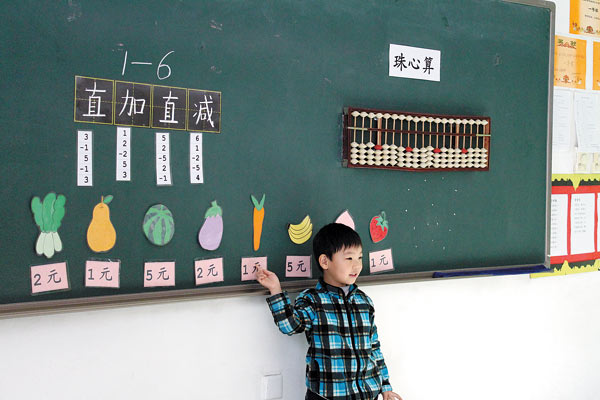 |
|
Tian Xingjian, 5, calculates on the abacus on the blackboard at the preschool attached to the Beijing Bright Horizon International Academy primary school. Xu Lin / China Daily Related video: Education crisis: Kids find abacus a total alien object |
The world is recalculating the abacus' added historical and contemporary value since the device was inscribed on the UNESCO World Heritage List last month. Xu Lin reports.
New interest in the ancient abacus can be seen on a preschool's blackboard, which is covered with photos of fruit with price tags and the ancient calculation device.
And it can be heard in the click-clack of children sliding abacus beads to answer teacher Zhang Jing's question: "How much would two bananas and three oranges cost?"
Tian Xingjian loves the class at the preschool attached to the Beijing Bright Horizon International Academy primary school, largely because of the playful pedagogical approach.
"It's very fun!" the 5-year-old says.
"I love all the games. I've learned how to buy things and calculate with an abacus."
|
A jade abacus with a yin-yang pattern in the center is part of the collection at the China Zhusuan Museum in Nantong in Jiangsu province. Xu Congjun / For China Daily |
The preschool is among the city's few that offer abacus classes. The two 40-minute classes a week use games to help students learn — and enjoy doing so.
"The numbers 1, 2, 3 are abstract to them," Zhang says. "It's easier for them to understand apples and pears. It arouses their interest in math."
Zhang believes merely memorizing and practicing abacus procedures would be too boring.
Tian's mother, Hu Hui, says the method has worked.
"(My son) has become more interested in math," says Hu, who works in finance.
"The abacus makes both his fingers and mind nimbler. He likes to play the fruit game at home in which he sells things and calculates prices."
The United Nations Educational, Scientific and Cultural Organization announced in early December that the traditional use of the Chinese abacus, or zhusuan, ranks among 25 new World Intangible Cultural Heritage List entries.
The innovation is acclaimed as humankind's "first computer".
It was widely used in China for more than a millennium, since its invention between 1,800 and 3,000 years ago. But its use was obscured by technological developments more than a decade ago since the electronic calculator became widely available.
Abacus courses were compulsory in Chinese primary schools until 2001, when the Ministry of Education subtracted abacus requirements from its Compulsory Education Mathematics Curriculum Standard. Abacus lessons gradually disappeared from colleges and universities, too.
In about a decade, the abacus went from a necessary skill to a math-instruction tool for select primary schools and kindergartens.
A five-year National Institute of Education Sciences study ending in 2009 found abacus education clearly boosts elementary school students' overall intellectual development. It builds IQ, memory, attention span, and problem-solving and presentation skills. It also benefits preschoolers, the research found.
Beijing Bright Horizon International Academy's principal Liu Liquan says the device has shown results in helping young kids learn math.
He says the school trained teachers after discovering a lack of standardization in their abacus lessons.
"They must realize it's only an auxiliary tool to learn math," he says. "It's not a skill we require kids to master to any certain level."
Lessons' availability diffuses outside first-tier cities.
|
|
|
|
|
|
|
|
